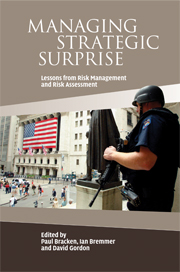Book contents
- Frontmatter
- Contents
- List of figures
- List of tables
- List of contributors
- Acknowledgements
- 1 Introduction
- 2 How to build a warning system
- 3 Intelligence management as risk management: the case of surprise attack
- 4 Nuclear proliferation epidemiology: uncertainty, surprise, and risk management
- 5 Precaution against terrorism
- 6 Defense planning and risk management in the presence of deep uncertainty
- 7 Managing energy security risks in a changing world
- 8 What markets miss: political stability frameworks and country risk
- 9 The risk of failed-state contagion
- 10 Conclusion: managing strategic surprise
- Index
- References
1 - Introduction
Published online by Cambridge University Press: 14 May 2010
- Frontmatter
- Contents
- List of figures
- List of tables
- List of contributors
- Acknowledgements
- 1 Introduction
- 2 How to build a warning system
- 3 Intelligence management as risk management: the case of surprise attack
- 4 Nuclear proliferation epidemiology: uncertainty, surprise, and risk management
- 5 Precaution against terrorism
- 6 Defense planning and risk management in the presence of deep uncertainty
- 7 Managing energy security risks in a changing world
- 8 What markets miss: political stability frameworks and country risk
- 9 The risk of failed-state contagion
- 10 Conclusion: managing strategic surprise
- Index
- References
Summary
The timing couldn't be better for a book on risk management and international affairs. Risks from weapons of mass destruction (WMD) proliferation, terrorism, energy availability, failed states, and from other sources are growing. The failure to anticipate major risks in the Iraq war has had enormous consequences, to say the least. And the continuing debate about how the intelligence community and the executive branch of government assess risk make it central to any discussion of foreign and defense policy.
For all of these reasons it is an opportune time to focus on how risk is assessed and managed in international affairs. But there is a second reason why the timing is right for a book on this subject. Separate from all of the above considerations is the emergence of risk management as a distinctive field of study which has transformed one discipline after another, in finance, business, engineering, environmental protection, and epidemiology. Today, it would be unthinkable for a company to invest money without first putting it through a risk “screen” to see what could go wrong. Assessment of an epidemic, likewise, entails a thorough-going risk analysis to see where interventions to stop it should be made. And analysis of engineering failures like the Columbia shuttle crash make a lot more sense when looked at from a risk management framework than from the customary practice of finding someone to blame it on.
- Type
- Chapter
- Information
- Managing Strategic SurpriseLessons from Risk Management and Risk Assessment, pp. 1 - 15Publisher: Cambridge University PressPrint publication year: 2008



